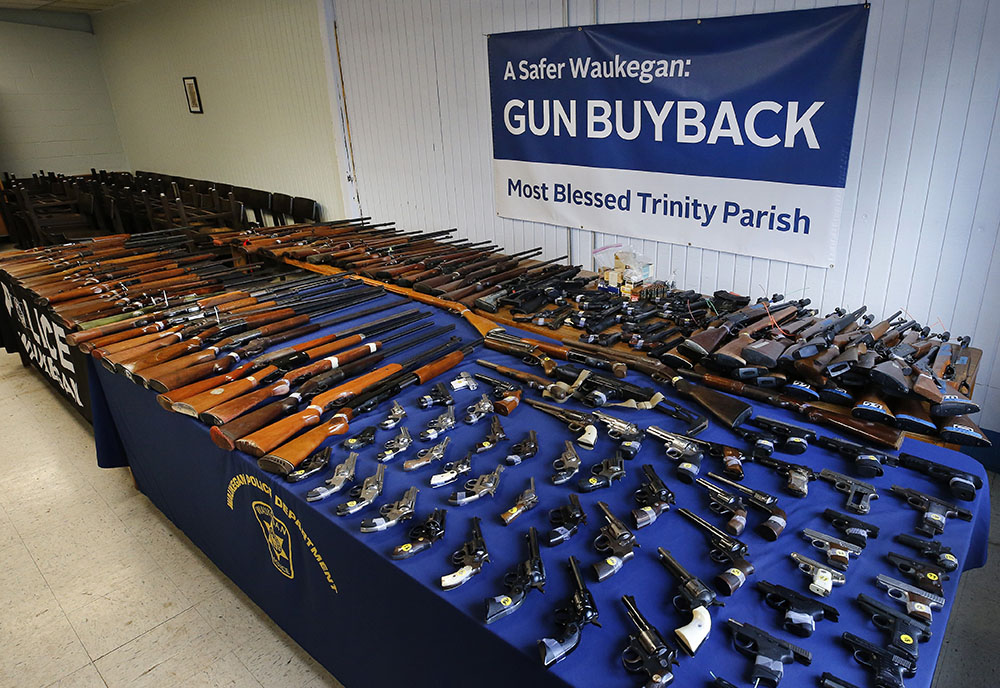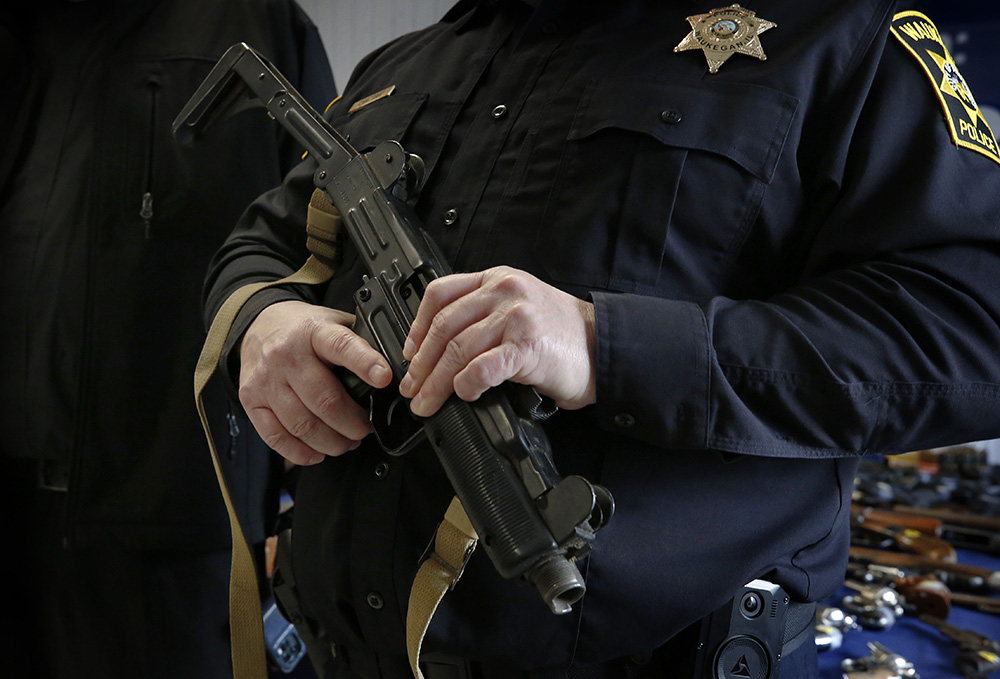
Most Blessed Trinity Parish in Waukegan, Illinois, collected 166 guns at a drive-thru gun buyback event on April 29. (Chicago Catholic/Karen Callaway)
A large Catholic parish in the Chicago Archdiocese collected 166 guns at a drive-thru gun buyback event on April 29.
Most Blessed Trinity Parish volunteered to work with the police department of Waukegan, Illinois, to host the event after the Chicago Archdiocese decided it was important to host a gun buyback in Lake County.
"We, in the Archdiocese of Chicago, know all too well how guns can ravage our communities, whether the daily violence plaguing city neighborhoods or the still-healing scars of last July's mass shooting in Highland Park," said Cardinal Blase Cupich in a statement about the event.
On July 4, 2022, a gunman killed seven people and injured dozens of others at a holiday parade in Highland Park in Lake County. In Waukegan, the county seat, the police have raised concerns about the increasing use of guns.
'If we can prevent one crime or one person being shot, then it's gonna be deemed a success.'
—Marvin Sabido
"Rather than allow ourselves to despair in the face of this mounting death toll, we must do as Pope Francis has asked and continue the work of eliminating gun violence by building a culture of peace," said Cupich, who announced that he and Auxiliary Bishop Jeffrey Grob would be donating to the buyback's funds from their personal resources.
While the buyback was scheduled to start at 11 a.m. at Most Blessed Trinity's Holy Family campus, people were lined up an hour early, so the event began at 10:15 with a continual line until it closed at 2 p.m., according to Marvin Sabido, Most Blessed Trinity's operations director.
In the six months that Sabido and the event's team worked to prepare for the buyback, they emphasized that those turning in weapons would remain anonymous.
"We want to create that trusting environment," Sabido told NCR in an interview before the event.
To participate in the buyback, participants pulled their cars up and opened their trunks to allow their weapon to be unloaded and then inspected by police. The officer determined whether the weapon was functioning or not and then the participant drove to another station to receive $100 in cash for a functioning weapon or $25 for a nonfunctioning weapon.
The police department announced that after the event all the guns would be destroyed.

Most Blessed Trinity Parish volunteered to work with the police department of Waukegan, Illinois, for a drive-thru gun buyback event on April 29. (Chicago Catholic/Karen Callaway)
Sabido told NCR before the event that the police department was also planning to give out gun locks and information about gun safety.
"If we can prevent one crime or one person being shot, then it's gonna be deemed a success," said Sabido.
Amanda Charbonneau, an associate policy researcher at the RAND Corporation who has studied gun buybacks, said that studies have not produced evidence that buybacks measurably reduce firearm-related harm, but that researchers do hear anecdotal stories about harm being prevented.
"A tiny fraction of the guns in a community are turned in at buybacks," Charbonneau explained. "While there could very well be incidents of firearm-related harm that are prevented, it's unlikely that we would be able to detect those in statistical research," Charbonneau said.
Charbonneau said communities should weigh opportunity cost and evaluate whether buybacks were spurring further action or coming at the expense of more effective gun violence prevention efforts. (RAND has reviewed the research on the effectiveness of 18 different types of gun policies.)
The question is "whether you're satisfying stakeholders, checking a box and not continuing efforts that would then prevent additional events, or is it building coalitions and leading to other violence prevention efforts that have an effect," Charbonneau said.
Advertisement
Eli McCarthy, author of A Just Peace Ethic Primer: Building Sustainable Peace and Breaking Cycles of Violence and adjunct lecturer at Georgetown University, said that gun buybacks could be an opportunity to connect participants with nonviolent skills trainings, where they could learn skills like nonviolent communication, active bystander intervention and unarmed civilian protection.
McCarthy, who is also director of programs for DC Peace Team, said he would advise bishops interested in gun violence prevention to listen to communities facing high rates of gun violence about their experiences and needs.
Dioceses should also invest in restorative justice practices and nonviolent skills trainings, which could help form unarmed civilian protection units to deploy in neighborhoods and events where there is potential conflict, said McCarthy.
"We live in a culture right now where our institutions and our policies are heavily invested in the threat of lethal violence to deal with a large range of conflicts and issues," said McCarthy.
"If we were to really go beyond the buybacks, which is important, but to also really invest in this broad sets of nonviolent skill trainings and preaching and teaching about Jesus' way of nonviolence," said McCarthy, "we could have a really big impact, not just on guns, but in the way that our political discourse and our political policies turn out."
In the wake of the Highland Park shooting, Archbishops Paul Coakley of Oklahoma City, William Lori of Baltimore and Salvatore Cordileone of San Francisco released a statement reiterating their support for a ban on assault weapons and limits to high-capacity weapons and ammunition magazines.
The archbishops wrote,"It is sobering to think that as horrible as mass shootings are, they are but a sliver of total annual homicides committed with guns; and gun homicides, in turn, are far outnumbered by gun suicides."
"May we live to see an America that can celebrate its freedoms without orphaning its children," they wrote.





